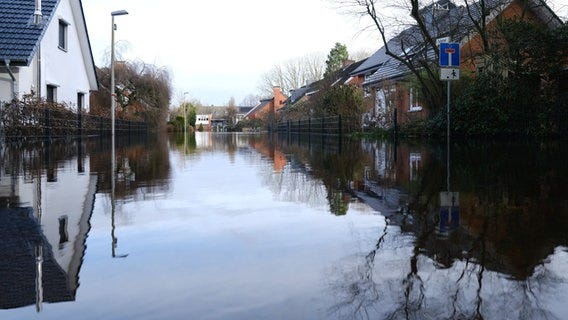How the ideological fantasy of a climate change-induced permadrought caused German dam operators to overfill their reservoirs before winter and exacerbated the massive December floods
For years we have been hearing that climate change portends a permanent drought in Central Europe. Although journalists and experts have repeated this mantra at every opportunity, it has very little empirical basis. Precipitation has only been increasing since the beginning of record-keeping, and while groundwater levels have been lower than average in recent years, this arises not from any long-term trend but rather from the anomalously dry years of 2018 and 2019. Precipitation varies; sometimes we have less of it, and sometimes we have more of it, and it has been this way since before mankind ever started burning coal and oil.
Contrary to all the most confident predictions, 2023 was not a drought year in Germany. It was rather a very wet year – so wet that groundwater levels recovered region-wide, with serious December flooding in Niedersachsen and Sachsen-Anhalt. The newspapers do not write of global warming-induced drought anymore; instead, they are singing a new tune about “more frequent periods of prolonged flooding in future winters as a consequence of climate change.”
This is all too predictable, but atmospheric carbon dioxide levels are not the only force acting upon German rivers. Humans exercise a direct influence on most major European waterways, and this makes their ideological delusions far more dangerous than any atmospheric gas. Since the eighteenth century, Germans have built an extensive system of dams and reservoirs to ensure that important arteries remain navigable for ship traffic, to store drinking water, to keep the supply to hydroelectric power plants constant and also – crucially – to control flooding. As the excellent Apollo News first pointed out, some dam operators spent the wet summer greedily hoarding overabundant water, and failing to notice this overabundance because the pre-December 2023 iteration of climate change doctrine held that Germany was facing a permanent precipitation deficit. We therefore entered our extremely wet winter with full reservoirs and basically no capacity to spare the downstream valley settlements by stopping up the excess:
The Harz dams are a prime example of mismanagement. The six dams have a maximum reservoir volume of 182 million cubic metres and a filling cycle that repeats itself every year. Around March, the reservoirs reach their highest level, at around 150 million cubic metres.
In the following summer, the reservoirs release more water than they receive and drain to between 80 and 60 million cubic metres, only to fill again to around 150 million cubic metres in the winter months …
In mid-April 2023, the Harz dams reached their spring peak of around 150 million cubic metres. Until then, everything was normal. However, instead of discharging the reservoirs … over the summer as usual, they releeased comparatively little water. At the beginning of October, still just over 120 million cubic metres were dammed up in the Harz reservoirs.
By way of comparison: At this point in 2022, the figure was 80 million cubic metres, or 40 million cubic metres less than in 2023. At the beginning of December 2022, the Harz dams only had 60 million cubic metres of water, while a year later it was 150 million cubic metres. Then, at the end of December, the worst happened. The Harz dams were 98.5% full. Individual dams, such as the Okertal Dam, had to release water in an uncontrolled manner, exacerbating the flooding in Niedersachsen.
Had the dam managers drained their reservoirs to historically normal post-summer levels, they could’ve retained around 45 million cubic metres of water to mitigate the December flooding.
As Bild reports, the Edersee dam in Hesse seems to have been mismanaged in exactly the same way. At the height of the flooding, this dam, which governs the second-largest reservoir in all of Germany, was forced to release vast quantities of water downstream, contributing to the further flooding of the Weser, because “this year the dam was already full, fuller than in previous years”:
The operators, the Federal Waterways and Shipping Administration (part of the Federal Ministry of Transport) and the Kassel Regional Council, stoically stuck to their self-imposed 5-year plan for winter conservation.
The idea: to collect water in winter to combat the threat of summer drought. The Edersee had run dry too often … The two authorities wrote at the end of November: “A wet management year like 2023 should not lull us into a false sense of security. Climate change is evident and there will be increasingly frequent periods of severe drought in the future.”
According to the Kassel Regional Council, the winter savings programme in 2022 and 2023 brought an additional 12 million cubic metres of water into the reservoir …
Obviously we have the benefit of hindsight, and there would have been flooding even had the reservoirs been kept at historically normal levels. It nevetheless seems highly negligent to enter the wettest months of the year with almost no capacity to store water in the event of continued heavy rain. After all, the end-of-year floods did not come without warning; in addition to December, July, August, October and November all saw above-average precipitation. The dam operators, however, kept the spigots closed, because climate change is less a scientific finding than it is a political construct and a parareligious dogma, and as such it proves quite robust to petty things like empirical observations and simple prudence.
UPDATE: Image corrected to show current flooding in Niedersachsen and not a past flood.



I don't envy the dam operators, having to try to predict what will happen with the weather. They're damned if they do and damned if they don't.*
Nevertheless, as you point out in your last paragraph, not leaving any extra capacity at all smacks of politically-driven ideology.
* Yes, the sole reason for this comment is the opportunity to make that joke.
These subhumans are not ideologues, they're predators... and they're aiming their vicious knives at our throats.